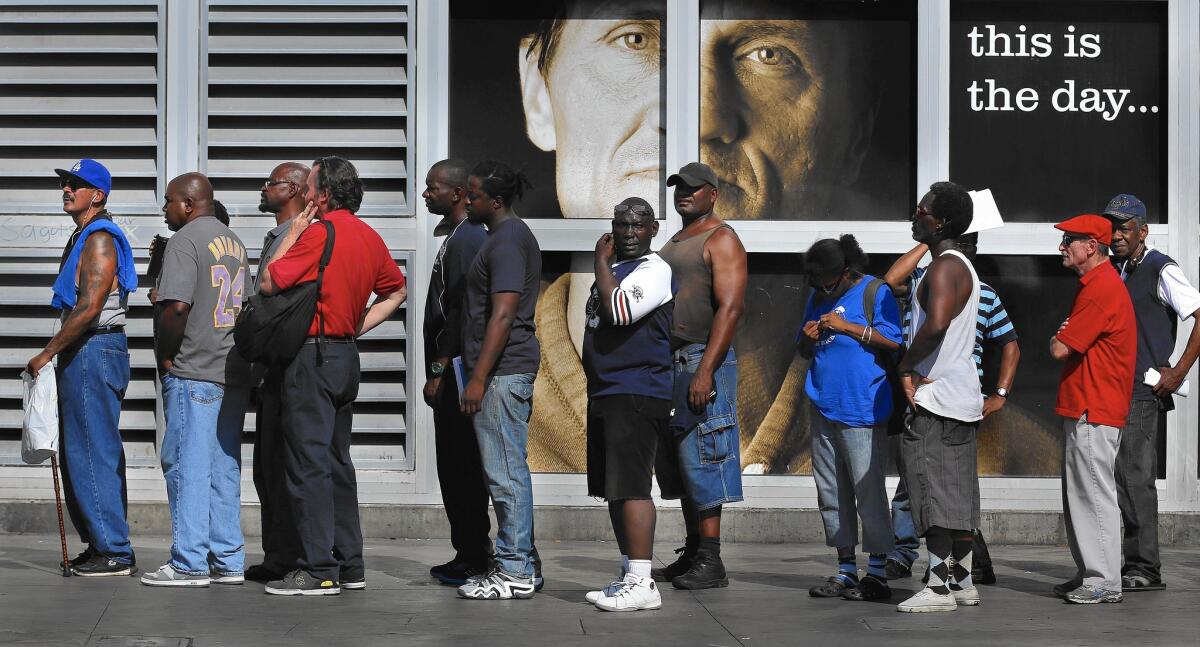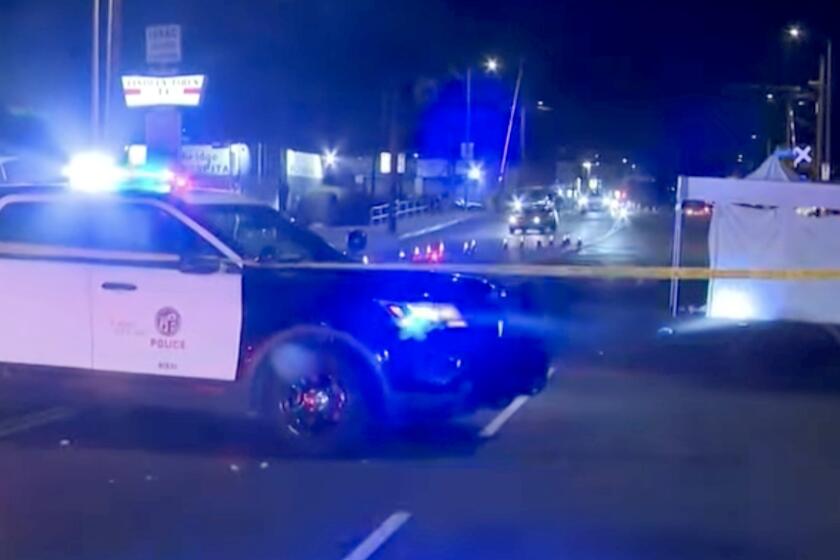L.A. City Council committee votes to ease penalties in homeless ordinance

People line up for a skid row homeless court and citation clinic organized by City Atty. Mike Feuer. Participants could have tickets, fines and warrants dismissed in exchange for community service or enrollment in drug counseling or other programs.
A key Los Angeles City Council committee on Wednesday moved to soften a controversial new homeless sweeps law, voting to omit arrests and fines for people who refuse to give up their property or put it in storage.
The council’s homelessness and poverty committee also passed an amendment to tie enforcement of the measure to expanding storage citywide for homeless people. The vote on dropping the penalties was 3-2, with Councilmen Jose Huizar, Marqueece Harris-Dawson and Gil Cedillo in the majority, and Curren Price and Mike Bonin opposed.
The ordinance would make it easier for the city to clear homeless camps from sidewalks and other public spaces.
The committee referred to the full council a staff report on providing showers, restrooms and storage bins for people living in the streets.
Committee members repeatedly said they had “decriminalized” the measure, which became law July 18 but was put on hold while amendments are considered. Any changes require approval by the full council and the mayor.
Homeless people who resist orders to impound or give up their possessions or fold up their tents could still be cited or arrested under a general city code for failure to comply with officers’ orders, police said during the committee meeting.
The proposed penalties had drawn fierce opposition from civil rights lawyers, clergy and homeless advocates, who accused council members of criminalizing homelessness and trying to push indigent people out of rapidly gentrifying neighborhoods, including downtown and Venice.
Downtown interests turned out in support of the ordinance as written, including Marie Rumsey, legislative director for the Central City Assn. of Los Angeles, a business group.
“There are many rights downtown, including the rights of the community to have clean and safe sidewalks,” Rumsey said.
Opponents said homeless people can’t pay tickets, which go to warrant, landing them in jail or disqualifying them from housing and jobs.
NEWSLETTER: Get the day’s top headlines from Times Editor Davan Maharaj >>
The legal wreckage routine traffic tickets can inflict on very poor people was on display earlier in the day at the Midnight Mission, where more than 100 people, most of them homeless, lined up to have their records wiped clean of fines and warrants.
The occasion was a skid row homeless court and citation clinic organized by City Atty. Mike Feuer. Participants could have tickets, fines and warrants dismissed in exchange for four hours per citation of community service, or enrollment in drug counseling, employment preparation or other programs.
David Martinez, 67, said he lost his car, his license and his livelihood because of $950 in traffic tickets triggered when his vehicle broke down in Tijuana, he said.
“That’s like debtors’ prison,” he said. “Only in America, I swear.”
Others said they faced thousands of dollars of sanctions for parking tickets. Sharon Burke racked up $8,000 in fines and spent two weeks in jail when an unpaid citation for evading a train fare was discovered during her shoplifting arrest, she said.
“It’s a big debt,” she said. “I’ll pay every penny back in community service if I can start fresh and get me another car.”
“We’ve seen a lot of people’s lives turned around,” Songhai Miguda-Armstead, supervising deputy city attorney, said of the program, which was recently revived after a hiatus because of recession-era cutbacks.
The Legal Aid Foundation of Los Angeles was one of half a dozen agencies with representatives stationed at card tables to help people get on welfare, find jobs and housing and fix their records. Attorney Nicole Perez said another option for the city would be to stop citing homeless people altogether.
“They’re citing people for jaywalking and sleeping on the street,” Perez said.
Her colleague, Gerald Murphy, added: “I’m in court twice a week with clients cited for that.”
Twitter: @geholland
ALSO:
Los Angeles City Council delays vote on bid for 2024 Olympics
L.A. cuts water use 21% in July, easily beating state target
L.A. council candidate starts paying $91,000 fine for bogus donor information
More to Read
Sign up for Essential California
The most important California stories and recommendations in your inbox every morning.
You may occasionally receive promotional content from the Los Angeles Times.










